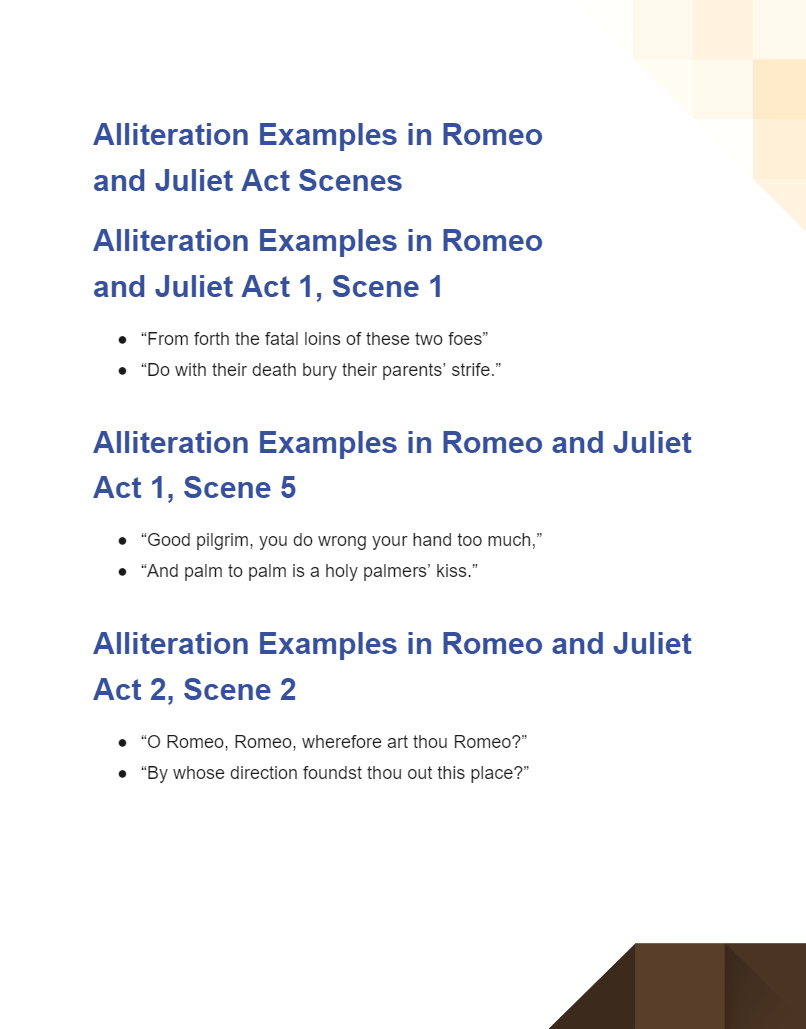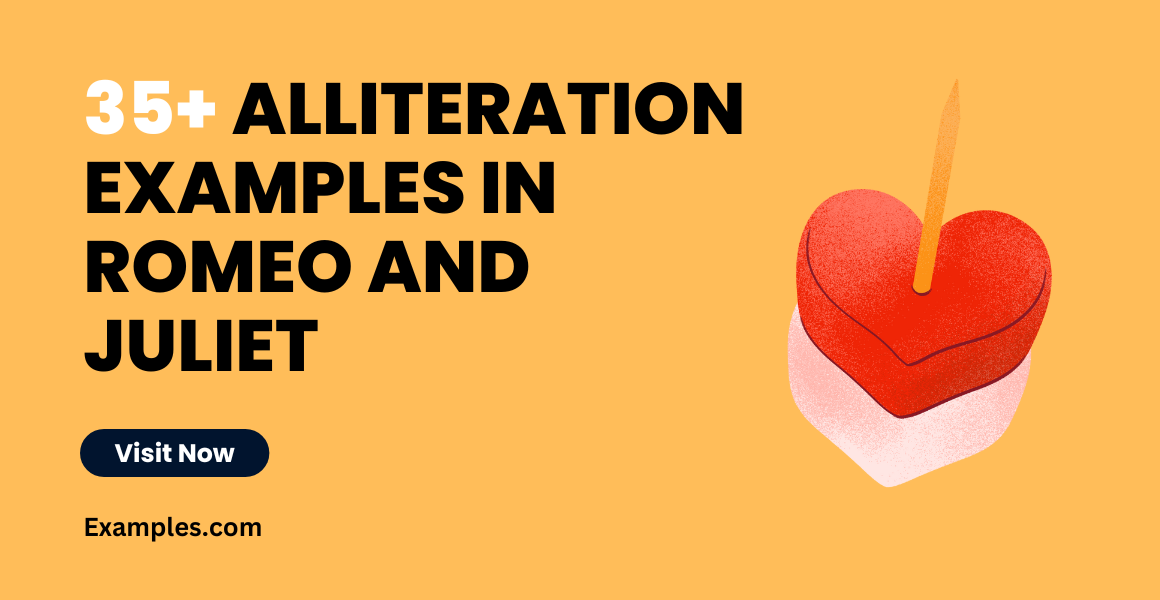35+ Alliteration in Romeo and Juliet Examples
“William Shakespeare’s ‘Romeo and Juliet’ is a masterpiece not just for its tragic tale of star-crossed lovers, but also for its poetic richness. Throughout the play, Shakespeare skillfully employs various literary devices, with alliteration being one of the most captivating. These repeating initial consonant sounds add musicality and emphasis, enhancing the emotional depth of scenes and dialogues. Journey with us as we explore some standout alliteration examples across different acts and scenes of this timeless play.”
What is an Alliteration in Romeo and Juliet?
Alliteration, as a literary device, is the repetition of the same initial consonant sounds in a sequence of words, typically in close proximity to each other. This technique enhances the rhythm, mood, and emphasis in lines, making them more memorable. In “Romeo and Juliet,” Shakespeare employs alliteration, among other poetic devices, to imbue the dialogue with a lyrical quality, adding layers of meaning, emotion, and musicality to the play’s powerful narrative.
What is the Best Example of Alliteration in Romeo and Juliet?
While choosing the “best” example is subjective, one of the notable instances of alliteration in “Romeo and Juliet” is from Act 1, Scene 5, when Juliet says:
“Good pilgrim, you do wrong your hand too much, Which mannerly devotion shows in this; For saints have hands that pilgrims’ hands do touch, And palm to palm is holy palmers’ kiss.”
Here, the repeated “p” sound in “pilgrim,” “palm,” and “palmers” emphasizes the purity and sincerity of the feelings Juliet and Romeo share, even as they meet for the first time.
Alliteration Examples in Romeo and Juliet Act Scenes

Alliteration, the repetition of consonant sounds, beautifully graces Shakespeare’s “Romeo and Juliet,” lending rhythm and resonance to the star-crossed lovers’ tale. The technique amplifies the play’s emotive power, making certain lines linger longer in the mind. Dive deep into these examples of alliteration sentence from different acts and scenes that capture the essence of Shakespeare’s genius
Alliteration Examples in Romeo and Juliet Act 1, Scene 1
- “From forth the fatal loins of these two foes”
- “Do with their death bury their parents’ strife.”
Alliteration Examples in Romeo and Juliet Act 1, Scene 5
- “Good pilgrim, you do wrong your hand too much,”
- “And palm to palm is holy palmers’ kiss.”
Alliteration Examples in Romeo and Juliet Act 2, Scene 2
- “O Romeo, Romeo, wherefore art thou Romeo?”
- “By whose direction found’st thou out this place?”
Alliteration Examples in Romeo and Juliet Act 2, Scene 3
- “The grey-eyed morn smiles on the frowning night”
- “Therefore thy kinsmen are no stop to me.”
Alliteration Examples in Romeo and Juliet Act 3, Scene 1
- “Thou, wretched boy, that didst consort him here,”
- “Mercutio’s soul is but a little way above our heads.”
Alliteration Examples in Romeo and Juliet Act 3, Scene 2
- “Gallop apace, you fiery-footed steeds,”
- “Come, civil night, thou sober-suited matron.”
Alliteration Examples in Romeo and Juliet Act 4, Scene 2
- “Go, go, you cot-quean, go,”
- “How sound is she asleep! I needs must wake her.”
Alliteration Examples in Romeo and Juliet Act 4, Scene 5
- “Death lies on her like an untimely frost”
- “O woe! O woeful, woeful, woeful day!”
Alliteration Examples in Romeo and Juliet Act 5, Scene 1
- “I dreamt my lady came and found me dead.”
- “Is it e’en so? then I defy you, stars!”
Alliteration Examples in Romeo and Juliet Act 5, Scene 3
- “Here’s to my love! O true apothecary!”
- “Thus with a kiss I die.”
Alliteration Examples in Romeo and Juliet Act 1, Scene 2
- “One fairer than my love? The all-seeing sun”
- “To turn your households’ rancor to pure love.”
Alliteration Examples in Romeo and Juliet Act 1, Scene 4
- “If love be rough with you, be rough with love;”
- “Give me a torch. I am not for this ambling.”
Alliteration Examples in Romeo and Juliet Act 2, Scene 4
- “Blind is his love and best befits the dark.”
- “Why, is not this better now than groaning for love?”
Alliteration Examples in Romeo and Juliet Act 3, Scene 3
- “Tears are womanish; a manly bosom”
- “By a name I know not how to tell thee who I am.”
Alliteration Examples in Romeo and Juliet Act 3, Scene 5
- “Wilt thou be gone? It is not yet near day.”
- “Night’s candles are burnt out, and jocund day.”
Alliteration Examples in Romeo and Juliet Act 4, Scene 1
- “On Thursday, sir? The time is very short.”
- “There is no world without Verona walls.”
Alliteration Examples in Romeo and Juliet Act 4, Scene 4
- “No, not a whit. What, I have watched ere now”
- “Need and oppression starveth in thy eyes.”
Alliteration Examples in Romeo and Juliet Act 5, Scene 2
- “The letter was not nice, but full of charge,”
- “I could not send it — here it is again.”
Throughout “Romeo and Juliet,” Shakespeare’s deliberate use of alliteration adds a layer of poetic beauty to the dialogue and narration. It helps to emphasize important moments, elicit emotional responses, and add rhythm and musicality to the characters’ spoken words. By studying these easy alliteration examples and understanding the context in which they’re used, readers and viewers can gain a deeper appreciation for the intricacies of Shakespeare’s craft.


